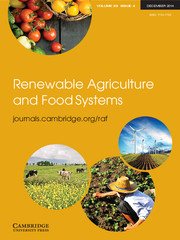Article contents
The impact of organic cotton cultivation on the livelihood of smallholder farmers in Meatu district, Tanzania
Published online by Cambridge University Press: 30 October 2014
Abstract
In Tanzania, as in many developing countries, cotton is an important source of income for smallholder farmers but also causes various negative effects through high pesticide and intensive land use. To overcome these effects organic agriculture is promoted by different non-governmental organizations (NGOs) and companies. This study examines how organic cotton cultivation influences the livelihood of smallholder farmers in rural Tanzania and focuses on three areas: (1) the motivation to change from conventional to organic farming, (2) experiences and challenges of farmers in the conversion process as well as in the period following the conversion, and (3) the attitude and perceptions of farmers toward organic farming in general. Qualitative interviews with organic farmers in Meatu district in the north of Tanzania, as well as expert interviews, were conducted and observations were made. Results show that although the organic price premium is an important incentive for farmers to convert to organic agriculture, access to training and advisory service are even more important, as no other sufficient agriculture extension service is available in the region. Due to a high level of poverty in the region, environmental motivations for conversion are not in the foreground. Furthermore, the study shows that organic farming can contribute greatly to the improvement of livelihoods in the region (improved soil fertility, increased yields and income, higher standard of living) and increases farmers’ ability to cope with challenges, mainly through knowledge transfer, access to capital and capacity building on a local level. Although positive effects on female farmers were identified, cultural preconditions (e.g., polygamy) harm efforts to strengthen women to a higher degree and gender disparities are still challenging. Further social problems (i.e., high birth rates, a poor education system and a lack of health care), global trading schemes as well as environmental factors (i.e., water scarcity and extreme weather events) cannot be fully offset by the conversion to organic cotton cultivation. Farmers in the Meatu region profit to a high degree from organic agriculture, mainly due to access to knowledge and extension services, nevertheless important challenges remain for farmers and their families.
Keywords
- Type
- Research Papers
- Information
- Copyright
- Copyright © Cambridge University Press 2014
References
- 15
- Cited by



